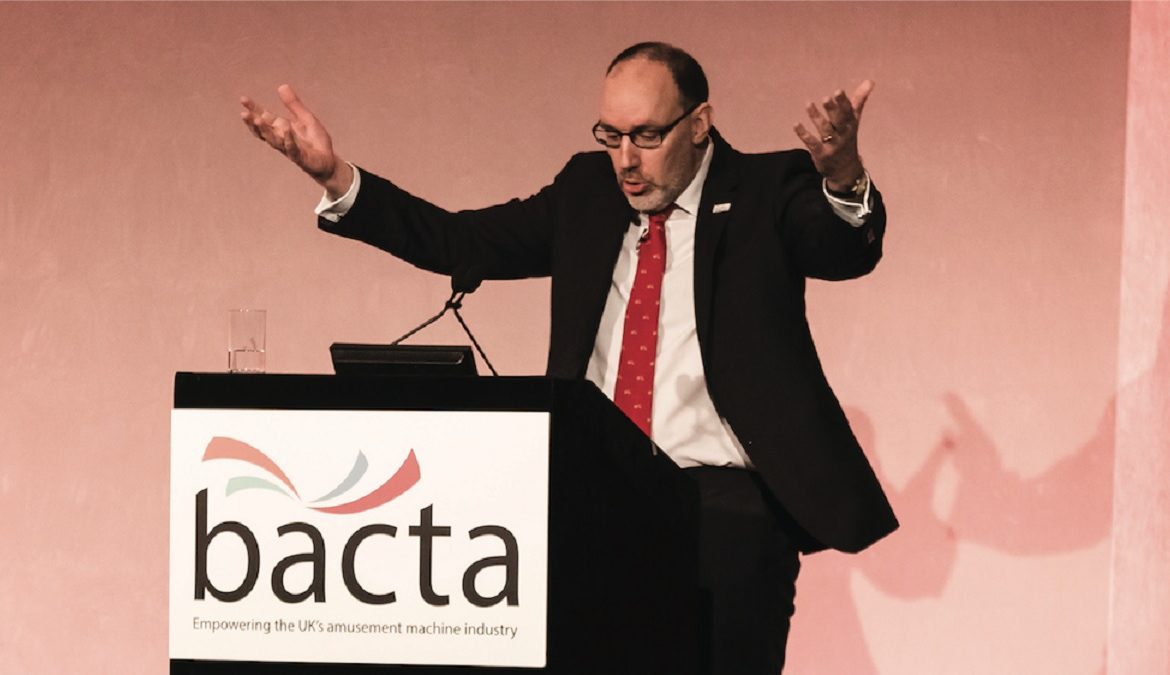There’s no time to rest for Bacta. A year of hard lobbying may have paid dividends on the FOBT battle, but the work’s only just beginning. John White talks to Coinslot Review about the twelve months that lie ahead, a full programme of campaigning, and the small matter of the most important trade event of the year for its membership.
What were the high and low points of 2018 from the trade association perspective?
John White: The high point has to be the successful culmination of a long-term lobbying effort to persuade government to cut the stakes on FOBTs. The announcement in May was a great day, accompanied by a very busy round of media inter views for the Bacta team. However we soon learnt that the implementation of the cut was being scheduled for April 2020 which was wholly unjustifiable and required the campaign to be restarted with alacrity.
The strong support we had garnered meant the case for ensuring the cut happened in April 2019 was put forcibly and government, in the teeth of a potential Budget rebellion, had to concede.
The low point came at the same time as the announcement of the FOBT stake cut, namely the failure of government to approve changes to the stake and prize regime for amusement machines. We now understand the political reasons why this couldn’t happen (although we did get an uplift for prize bingo), but the Gambling Commission-inspired comments that nothing could be done for cranes and pusher s because the industry had not come forward with additional player protection measures left the industry bemused, and still does. For an evidence and risk-based regulator there has been silence as to what this statement actually means.
CR: The work of a trade body is clearly never done. Going into this new year, where will your focus be in the coming twelve months?
JW: We have in Bacta a range of amusement industry sub-sectors that require different emphasis.
For the AGC sector the work continues on strengthening player protection measures on category B3 products. The Bingo Association-led messaging project of which Bacta is a part will form a major pillar of our Social Responsibility work during 2019.
We will also need to continue to explain why play tracking on B3 machines for our sector is a non-starter. The cost alone would kill the industry let alone the lost revenue from players who stopped playing as a result of being tracked.
We believe the best way to spot problematic behaviour and intervene appropriately is through our staff. We are continuing to invest in training to do so. For the seaside sector it will be important to position this traditional and fun part of the seaside as just that. The FOBT debate has focused too much on gambling. That’s not what customers see or experience when they visit the coast. For them it is all about fun. We need to remind customers and indeed non-customers of that as well as invest in the experience. There are plenty of operators who are doing great things with their FECs and it will be good to see how 2019 pans out for them.
At a political level we will continue our engagement programme with politicians and other stakeholders to explain to them the Serious Business of Fun.
Our single site operators have particular challenges in the pub and club sector. Top of the agenda is how we can offer customers a cashless payments option. A solution to that conundrum will come to market during 2019.
We also have upped our engagement with the copyright licensing bodies and are currently in negotiations on the level of the dubbing fee.
For our manufacturers and distributors they will once again be exercising their creative energies which will be on show at EAG. Underpinning our agenda is a need to develop new products and new offers that appeal to a wider audience. We have to expand our player base.
CR: The industry has found itself battling against many forces, many of which are based on misconceptions. How do you think this has happened and, more importantly, how are you going to work to change this?
JW: The FOBT debate has brought a lot of focus to the gambling side of our business. With that has come misunderstandings and misperceptions. The campaign has at the same time given us unprecedented access to the journalists and our voice is now regularly heard on the airwaves, on TV and in the press. This gives us the opportunity to establish the contours of any discussion. That is so helpful in ensuring balance and accuracy as well as helping us to set the agenda.
CR: There is a change at the Gambling Commission helm. Do you feel it’s becoming a body you can do business with? And insodoing, what concessions will you be pushing for that would move your members interests forward?
JW: The Gambling Commission is always going to be the principal relationship for Bacta. The early signs of the new regime is that it wants to do business. Time will tell.
We will always engage with openness and consistency. Our agenda on social responsibility chimes with the Commission’s expectations. In return our expectations are that the Commission works with us on product innovation in time for the next Gambling Review.
CR: Politicians are always vital in your dialogue. Do you sense a lack of understanding about what the industry represents? And what messages will you be trying to convey to them?
JW: Politicians are bombarded with information. It is almost impossible for them to grasp the nuances of any industry or issue. Having said that, engagement both by Bacta and crucially by members with their constituency MPs, builds an understanding that cannot be achieved by one-off meetings or letters.
Also having a few well briefed ‘friends’ in the House provides the bridgehead for more widespread engagement.
What we convey to MPs is simply that Bacta and its members are an intrinsic part of the leisure scene and at the coast are frequently one of the few economic actors in often deprived areas of our country. As responsible employers, tax payers and providers of fun we deserve to be supported.
CR: Bodies like GambleAware have a more prominent role in the direction of our industry. Do you think this influence is positive and if not, how do you think it should be changed?
JW: All stakeholders bring something to the party. The extent to which the regulator and the government assess their contributions to any particular debate will be influenced by the quality of what they say and the way that they say it. We judge other organisations in exactly the same way. Those that are sensible, measured and base their comments on evidence should be listened to.
CR: When it comes to asking for crucial changes that the industry needs now, what would your top 5 requirements be?
JW: In no particular order we would be driving for :
• Cashless payment systems for pubs
• New categories of machines to allow us to innovate
• Stake and prize increases to help us recover the costs that we cannot pass on
• Acknowledgement, support and a collaborative approach to the industry’s SR initiatives
• A refreshed relationship amongst the trade bodies in order to foster a common approach where possible.
This article was originally published on www.coinslot.co.uk




